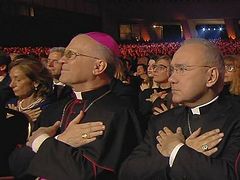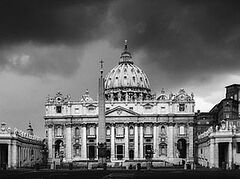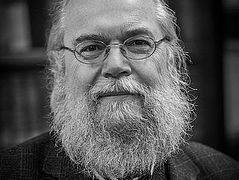A recent report by Alexander Shchipkov1 on the new encyclical of Pope Francis, Fratelli Tutti (“All Brothers”), gives an overview of this Vatican “manifesto” and draws quite unambiguous conclusions that I cannot refrain from sharing with you.
This Catholicism is no longer the Catholicism which was criticized by the Holy Fathers and apologists of the past. It is not even the Catholicism that, as Dostoevsky said, had given in to all three temptations the devil used to test the Lord in the wilderness.
As long as we were thinking that what divided us Orthodox from the Catholics were dogmas like the Filioque, Ex cathedra (papal infallibility), Primatus Papae, belief in Purgatory, and the Immaculate Conception of the Virgin Mary, we still had some chance for successful dialogue. There were chances to prove, via diaolgue, the fallacy of their exegesis of the Holy Scriptures and their interpretations of the early Fathers. There is always hope in conversation with someone whom you are united with by a common faith in Christ.
But the Catholic teaching of “development of doctrine” deprived us once and for all of any chance we had for closer relations. While we were attempting to find the points of divergence with Catholics in history, looking back to the eleventh century and earlier, in order to eliminate the causes of the errors and divisions that had appeared, Catholicism itself was drifting ever further from its Orthodox origins.
True, this movement had begun before the formulation of “development of doctrine.” Moreover, it had begun even before the Schism of 1054. It is more likely that that significant year merely solidified and formalized what had been ripening for several centuries. But as late as the nineteenth century, there were still chances for successful dialogue. In spite of all the Catholic persecutions of Orthodoxy, all the false doctrines, the Unia and the differences in spiritual practices… Yet over the course of nine centuries, each one left fewer and fewer reasons for optimism… And the “reasons for optimism” were increasingly based not on real premises, but on Christian belief in a miracle, in the hope of the heart and our love for enemies.
Yet as we looked for ways to prove the fallacy of the Filioque, Catholicism drifted ever further from the Creed—not just in terminology, but also in substance, giving absolutely new and foreign meanings to old formulas. Our theologians, in all sorts of joint commissions with Catholics, were chasing after a train that had long ago departed… While some were chasing the train, others attempted to use this desire for dialogue as a pretext to make contacts, to pull us in and impose their agenda.
The apostle said, Know ye not that the friendship of the world is enmity with God? Whosoever therefore will be a friend of the world is the enemy of God (Jm. 4:4). And Catholicism has for a long time longed to not only be friends with the world, but also to rule it. These days, the term used to describe this is “influence.”
And indeed we see that the papal encyclical does not offer the word any new, unfamiliar values. Neither does it stand guard over values that the world knows but rejects. It just reflects and absorbs that which the world is filled with: left-wing liberal ideology.
We won’t find this spirit of the apostolic preaching in the papal proclamations: For the Jews require a sign, and the Greeks seek after wisdom: But we preach Christ crucified, unto the Jews a stumblingblock, and unto the Greeks foolishness; But unto them which are called, both Jews and Greeks, Christ the power of God, and the wisdom of God (1 Cor. 1:22-24). Today’s Catholicism wishes to look neither like a stumbling block nor like foolishness. It seeks to look relevant and popular. Actually, it was the same centuries ago. But several centuries ago, Catholicism didn’t need to dilute Christianity in the world so dramatically in order to reflect the values of the world. The world itself was more Christian at that time.
Today the time has come to reconsider our relations with Catholicism. True, there are still some positions that bring us close, but year after year there are fewer of them. Just two weeks ago, it would not have been out of place to say that our stances on family values united us. And now the Pope has eroded this thesis as well…
It is likely that the same fate awaits their attitude toward abortion, drug use and other questions to which the Orthodox and the Catholics previously had identical answers. Now we watch as we lose our unity on these issues just as we once lost our dogmatic unity.
With whom do we need to have a dialogue with if the liberal “post-Christian” wing of the Roman Catholic Church is taking the lead in it, driving and defining its teaching? Probably with those who hear the call of their Christian conscience and cannot accept the de-Christianization of Catholicism: conservative Catholics. Yesterday, we failed to convert them to Orthodoxy. But today before our very eyes the chances are growing that the Vatican will do this itself by driving them away. Because The things which are impossible with men are possible with God (Lk. 18:27).
Conservatives in the Catholic Church are still strong, but they are already much weaker than they were five or ten years ago. And the process by which they are losing their influence is escalating. When the neo-liberal ideology has completely triumphed in the Vatican, where will they seek Christ and the true Church of Christ? Only in Orthodoxy.
Even today, our response to the liberalization of Catholicism should be a call to those for whom our hearts ached all these centuries, “Return to the faith of your ancestors!”
What we need today is not to pursue a Catholicism that is fleeing from Christ. What we need is that those who seek us, our Church and unchanging Christian values, be able to find us exactly where they will seek us—near our Lord and Savior.





He is more an infallible Pope than the Popes of old Rome.